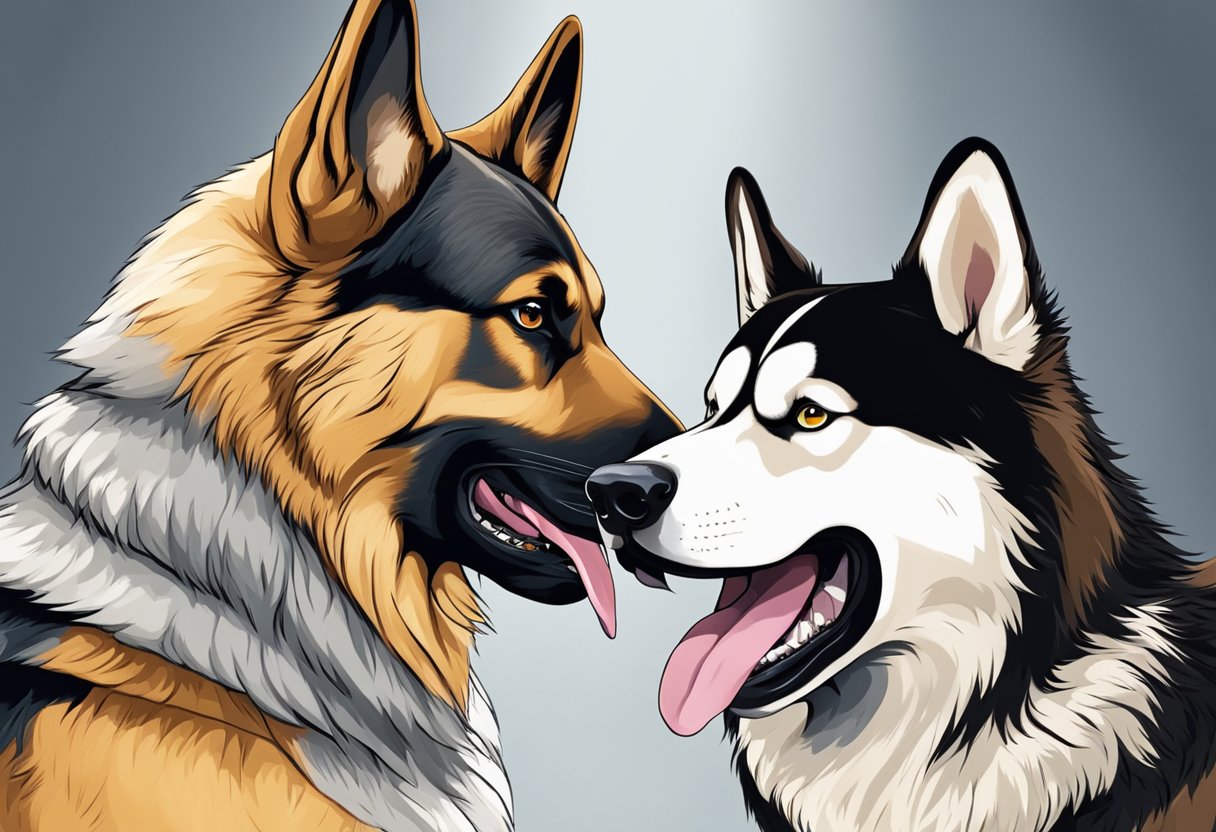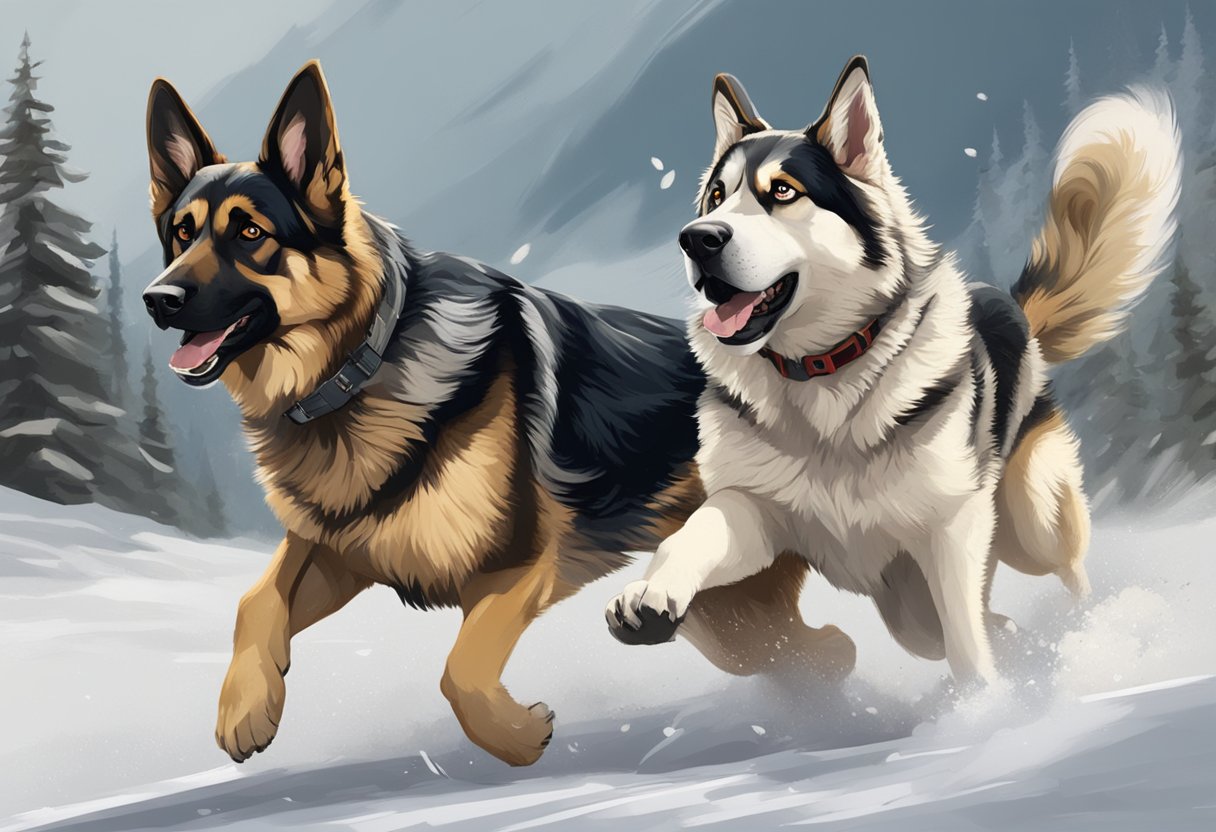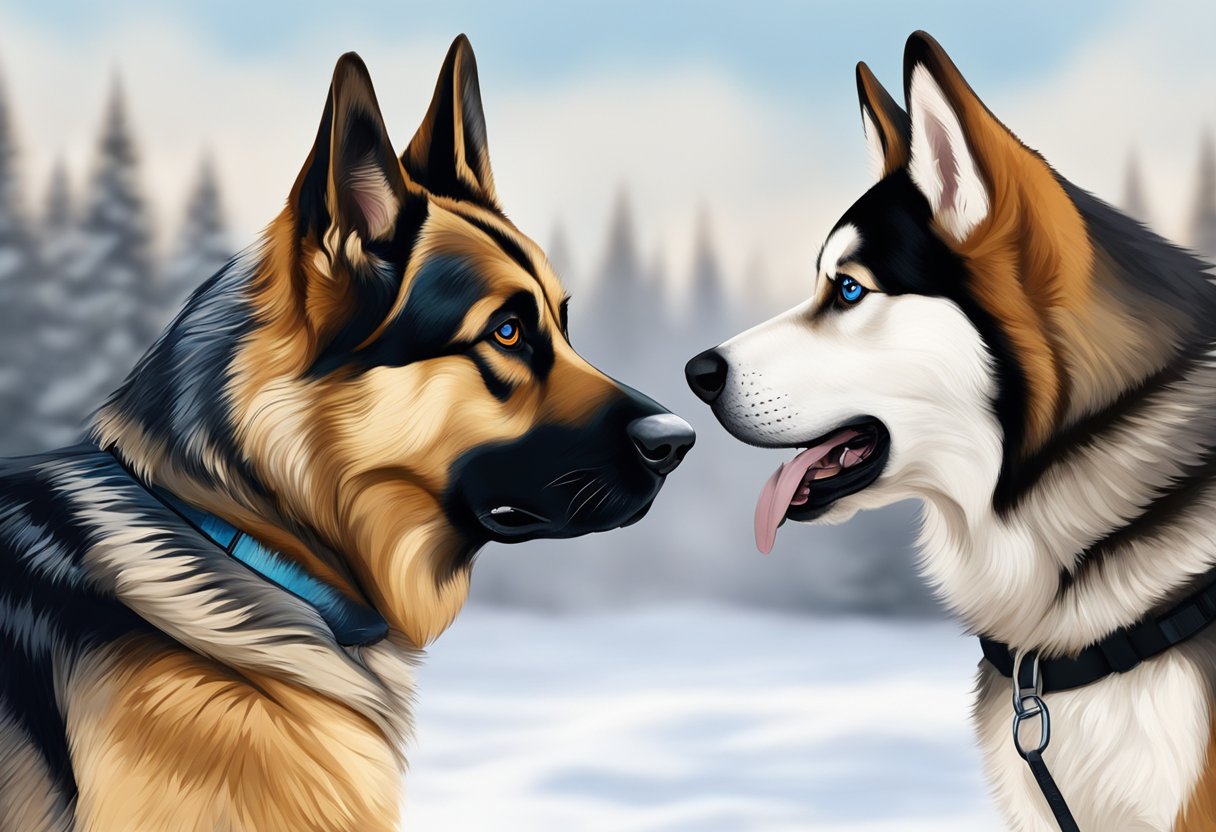Dog enthusiasts and experts often have mixed opinions when debating who would win in a theoretical confrontation between a German Shepherd and a Siberian Husky.
Both breeds are known for their intelligence, loyalty, and unique skills, favored as pets and workers. But in a theoretical strength and strategy showdown, who would win?
In a hypothetical fight between a German Shepherd and a Husky, a German Shepherd might have the upper hand due to its strength, agility, and training in protection, making it more formidable in a confrontation than the Husky, which is more of an endurance runner.
To illuminate this fascinating comparison and decide the winner, let’s delve into the strengths, abilities, and temperaments of the German Shepherd and the Siberian Husky.
I must emphasize that promoting dog fighting is unethical and illegal; the discussion here is purely theoretical and intended for educational purposes.
Key Takeaways:
- The German Shepherd stands out for its high intelligence, versatility, and strength, making it a formidable contender in any hypothetical matchup.
- The Siberian Husky is celebrated for its endurance, speed, and ability to thrive in cold climates. Due to its agile and lively demeanor, it offers a distinct challenge.
- Debating a German Shepherd vs. Siberian Husky fight is speculative and depends on many factors.

Breed Characteristics
When comparing who would win a fight between the German Shepherd and the Siberian Husky, you must consider their ancestry, which has shaped their physical traits and capabilities.
Ancestry and Origin
German Shepherd: Originating in Germany, this dog was bred primarily for herding and guarding sheep. Their lineage gives them a strong work ethic, and their intelligence and trainability make them suited for various tasks.
They are associated with roles that demand strength, bravery, and agility, such as police and protection work.
Siberian Husky: Hailing from the harsh climate of Siberia, these dogs were bred by the Chukchi people. They are known for their exceptional endurance and stamina, having been used historically as sled dogs over long distances.

Physical Features
German Shepherd:
- Weight: Male: 30-40 kg (66-88 lbs), Female: 22-32 kg (49-71 lbs)
- Height: Male: 60-65 cm (24-26 in), Female: 55-60 cm (22-24 in)
- Coat: Their double coat varies from medium to long, with colors including tan and black or red and black.
- Shedding and Grooming: They have a heavy shedding period twice a year and require regular grooming.
Siberian Husky:
- Weight: Male: 20-27 kg (45-60 lbs), Female: 16-23 kg (35-50 lbs)
- Height: Male: 54-60 cm (21-23.5 in), Female: 50-56 cm (20-22 in)
- Coat: Huskies boast a thick double coat that can handle very cold temperatures. Their coats commonly have markings that resemble wolves.
- Shedding and Grooming: Expect heavy shedding, especially during seasonal changes; they also demand consistent grooming.
Both breeds exhibit a double coat that requires attention to manage shedding, but their individual heritage has equipped them with unique features suited to their initially intended roles.
Temperament and Behavior
When it comes to understanding who would win between a German Shepherd and a Siberian Husky, temperament and behavior play crucial roles.
You’ll see distinct personality traits and differences in training and intelligence, which can influence the outcome of a scrap between these two breeds.
Personality Traits
German Shepherds are known for their loyalty and protective nature. Due to their strong temperament, they are often used in police work and military roles.
Their affectionate manner makes them excellent family pets, balancing their protective instincts with a gentle demeanor towards their own.
In contrast, Siberian Huskies are friendly pets with a more mischievous streak. They exhibit high energy levels and prey drive, which can be mistaken for aggressiveness.
However, they’re not typically known for being guard dogs like German Shepherds.
Huskies tend to be very sociable and affectionate with their families, but their independent nature can sometimes come across as stubbornness.
Training and Intelligence
German Shepherds:
- Intelligence: Highly intelligent, ranked third among canine breeds.
- Training: They excel in obedience and are eager to learn, making them ideal for various jobs such as search and rescue.
Siberian Huskies:
- Intelligence: Smart but can be independently minded, requiring a patient training approach.
- Training: May exhibit stubbornness, which can be mitigated with consistency and positive reinforcement.
German Shepherds generally find a place in roles that require a high level of training and discipline, such as search and rescue. Their intelligence and eagerness to please make them easier to train.
On the other hand, while Huskies are smart, they sometimes show an independent streak that can challenge training efforts.


Physical Capabilities
When comparing the German Shepherd and the Siberian Husky, you’re likely curious about their respective strengths and how they might perform in various physical activities.
Their capabilities are quite distinct, rooted in their historical roles as working dogs.
Strength and Endurance
German Shepherds are known for their impressive physical strength and bite force, reaching up to 238 psi, making them formidable police dogs.
Their muscular build contributes to their reputation as reliable herding dogs capable of performing various demanding tasks.
On the other hand, Siberian Huskies boast a remarkable ability to pull sleds over long distances, a testament to their stamina and endurance.
Their history of sled pulling in harsh Siberian weather conditions has equipped them with physical strength and incredible staying power.
| Breed | Strength Attributes | Endurance Qualities |
|---|---|---|
| German Shepherd | High bite force (238 psi) | Suitable for herding and police work |
| Siberian Husky | Suitable for pulling tasks | High stamina for long-distance sledding |

Agility and Speed
In terms of agility, your German Shepherd is highly coordinated, which is essential in their role as police dogs involving tracking and apprehension, where quick and nimble actions are necessary.
Siberian Huskies may not be as agile as other dogs, but they are exceptionally athletic and capable of maintaining their speed over long periods, which is crucial in sled races and other endurance competitions.
- German Shepherd: Agile and fast, suitable for quick maneuvers and police work.
- Siberian Husky: Athletic with speed and endurance, ideal for sledding activities.
Whether the German Shepherd’s controlled strength and agility or the Husky’s sustained athletic ability and endurance, each breed possesses unique physical capabilities molded by their history as herding and sled dogs, respectively.
Health and Care
We must also consider the health and care of each breed, as these factors contribute significantly to their overall capabilities.
Your dog’s well-being is vital to their potential performance in any physical activity.

Life Expectancy and Common Ailments
German Shepherds have a life expectancy of 9-13 years. They’re prone to hip dysplasia, a condition that can severely affect their mobility and may influence their ability to engage in physical confrontations.
Siberian Huskies generally live between 12 and 14 years and can also suffer from hip dysplasia, although it is less common in them than in German Shepherds.
Both breeds can experience eye problems, such as cataracts, which could impact their performance.
| Breed | Life Expectancy | Common Health Issues |
|---|---|---|
| German Shepherd | 9-13 years | Hip Dysplasia, Elbow Dysplasia, Degenerative Myelopathy |
| Siberian Husky | 12-14 years | Hip Dysplasia (less common), Progressive Retinal Atrophy |
Diet and Nutrition
Your dog’s diet is fundamental for maintaining optimal health and performance. A balanced diet with high-quality protein, healthy fats, carbohydrates, vitamins, and minerals is vital.
For German Shepherds, include food that supports joint health to help manage the risk of hip dysplasia.
Siberian Huskies may thrive on a similar diet; some owners include rice as a carbohydrate source for sustained energy.
- Key Nutritional Needs:
- High-quality protein for muscle maintenance
- Healthy fats for energy
- Carbohydrates like rice for sustained energy levels
- Essential vitamins and minerals
Having health insurance for your dog might alleviate the financial burden of managing these health conditions and ensure they receive proper care.
Always consult your veterinarian to tailor a feeding plan that suits your dog’s specific needs and health conditions.

FAQs
Which breed has a stronger bite force, a German Shepherd or a Siberian Husky?
Siberian Huskies have a bite force of 320 psi, which is significantly stronger than the German Shepherd’s 238 psi.
Which breed is considered more powerful – a German Shepherd or a Siberian Husky?
German Shepherds are generally considered more powerful due to their protective roles and use in police work, which requires strength and endurance.
Is a German Shepherd more likely to win in an altercation with other dog breeds?
While German Shepherds have a reputation for being a strong breed, the chance of them winning an altercation with other dog breeds depends on various factors, such as the size and aggressiveness of the other breeds.
For example, in a fight with a Cane Corso, my money would be on the Cane Corso due to its muscular build and stronger bite force. Yet the German Shepherd would likely beat a Labrador.
Does a Siberian Husky or a German Shepherd have an advantage in agility and defense?
German Shepherds are acclaimed for their agility and quickness, which are essential in defense situations, while Siberian Huskies are also agile but may have less defensive behavior.
Let’s Sum This Up!
Although it is an interesting debate, both breeds are primarily companions and pets who deserve to be treated with care and respect, not pitted against each other in fights.
Responsible dog ownership involves understanding and appreciating each breed’s attributes, providing them with a loving home, and discouraging any form of animal cruelty or combat.
Related Posts You May Like:





